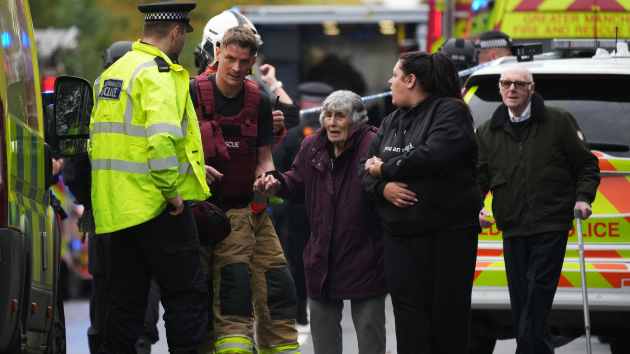Killing of 5-year-old girl in Gaza sparks international condemnation as war continues
Written by ABC Audio ALL RIGHTS RESERVED on May 29, 2024

(LONDON) — “Come take me, will you?”
It’s Jan.29, 2024, and the fighting is raging in Gaza City. The voice on the telephone belongs to 5-year-old Hind Rajab, alone and trapped in a car with her extended family, talking to a Palestinian Red Crescent (PRCS) dispatcher.
“Do you want me to come and take you?” Rana Faqih, the dispatcher, replied.
“I’m so scared, please come. Please call someone to come and take me,” Hind said.
The PRCS released the audio of the phone call, making an international appeal to return Hind to safety.
The appeal went viral, but neither Hind, nor the rest of the group with which she was travelling, survived. Twelve days later, her body was discovered in the charred remains of the vehicle.
The phone calls
Hind and members of her family — her aunt, uncle and four cousins — were evacuating from Gaza City that morning, heading south, when they came under fire. The first to call emergency services was Layan Hamadeh, Hind’s 15-year-old cousin.
“They are shooting at us,” Layan told dispatcher Omar al-Qam in audio recordings provided to ABC News by the PRCS. “They are shooting at us. The tank is next to me.”
“Are you hiding?” Al-Qam asked.
“Yes, in the car, we’re next to the tank,” Layan said.
Al-Qam asked again whether Layan was in the car. Then heavy gunfire could be heard, followed by screams, and the line went silent.
Moments later, Hind picked up the phone.
“They are dead,” she told Rana Faqih, the Palestinian Red Crescent dispatcher, based miles away in Ramallah, in the occupied West Bank.
Faqih spoke to Hind for several hours, as the PRCS sent an ambulance with two emergency responders, Yousef Zeino and Ahmed al-Madhoun, to rescue her. Faqih and Hind read the Quran together and played counting games to distract Hind from the devastation around her.
“It was a voice of a sad and terrified kid,” Faqih told ABC News.
“She told me, ‘It’s dark, I am afraid of darkness, it’s really dark out there.’ So I told her, ‘Do you know how to play hide and seek?’ She said yes. … But honestly, I didn’t know that I will be counting with for 12 days,” said Faqih, referring to how many days passed before Hind’s body was found.
The ambulance never arrived. It, too, was discovered destroyed and the two responders dead 12 days later, barely a quarter of a mile from where Hind’s vehicle was found.
The PRCS said they coordinated with the Israeli Defense Forces (IDF) when they sent the ambulance to rescue Hind. The IDF has denied that it had coordinated with the PRCS to create a safe passageway, saying they were not fighting in that area at the time.
Speaking to ABC News from Gaza City, Hind’s mother, Wissam Hamada, recalled the moment she was able to speak to Hind, when the PRCS dispatcher patched her into the phone call to help calm her daughter. Hamada said Hind was a “very smart” and “ambitious” child who had dreams of becoming a dentist.
“God bless her,” Hamada told ABC News. “And she didn’t cry. Hind, when I was on the phone with her, my heart was burning and I was crying. She was very strong.”
“I swear, I never imagined this for a moment,” Hamada said of her daughter’s death. “I never imagined for a second and it never crossed my mind for a minute that she would come back to me a martyr, not for a moment or a second.”
‘An unspeakable tragedy’
The U.S. State Department called for Israel to investigate the circumstances of Hind’s death, with spokesperson Matthew Miller saying in February that it was “devastated by the reports about the death of Hind Rajab,” and that we expect those results on a timely fashion and they should include accountability measures as appropriate.”
Satellite imagery taken on Jan. 29 at 15:31 local time and verified by ABC News captured four armored military vehicles on a street roughly 200 yards north of where Hind’s body was found. Despite the satellite imagery appearing to show the presence of Israeli military vehicles, Israel initially denied its forces were involved in Hind’s death, declaring in a statement on Feb. 25: “It appears that IDF troops were not present near the vehicle or within firing range of the described vehicle in which the girl was found.”
In April, however, the Washington Post published an investigation into Hind’s death based on dispatcher recordings, photos and videos of the aftermath, and more than a dozen interviews. The newspaper reports that they also spoke with military, satellite, munitions and audio experts as part of the investigation. They determined that there were more than a dozen Israeli armored vehicles visible within a quarter mile of the Hamada family car, in which Hind Rajab died, and that the sound of gunfire from the call with Layan, as well as photographic evidence of the bullet holes in the car, were consistent with weapons used by the Israeli army.
The IDF referred ABC News to their previous statement when asked for further comment in light of the Washington Post investigation. However, a State Department spokesperson recently told ABC News that “the Israelis told us there had, in fact, been IDF units in the area, but the IDF had no knowledge of or involvement in the type of strike described.”
At a background briefing last month, ABC News asked the U.S. State Department whether they were satisfied with Israel’s preliminary investigation. A spokesperson said that Hind’s death was “an unspeakable tragedy,” and that the State Department would ask Israel about the findings of the Washington Post investigation.
On May 21, four months after Hind’s phone call pleading for rescue, Mohamad Habehh, a member of American Muslims for Palestine, heckled Secretary of State Antony Blinken as he testified on Capitol Hill, accusing him and the U.S. of culpability in Hind’s death.
The State Department issued a new statement last week, saying they were “devastated” by Hind Rajab’s death, and that they had “repeatedly raised this case and sought more information from multiple officials with the government of Israel and the U.N., both when the initial report broke and when the vehicle itself was found with bodies inside.”
“The Israelis told us there had, in fact, been IDF units in the area, but the IDF had no knowledge of or involvement in the type of strike described,” the State Department statement continued. “The Israeli government also told us they would welcome any details to assist in investigating. We continue to welcome a full investigation into this terrible tragedy.”
Hind’s legacy
Hind’s story, Faqih told ABC News, is just one among many as the war in Gaza continues, with hundreds of thousands of Palestinians now forced to leave Rafah, the southern enclave to which more than a million Palestinians have fled for safety since the war began.
However, Hind’s death has sparked widespread outrage as the audio of the PRCS call went viral on social media. Her name has become a rallying cry across the world as Israel’s conduct in the war against Hamas in Gaza, launched after the Oct. 7 Hamas terrorist attacks against Israel, which Israel says killed about 1,200 people, comes under increasing international condemnation. More than 35,000 Palestinians have been killed since the fighting began, according to the Hamas-run health ministry in Gaza.
Neither Hamada nor Faqih, who spent so many hours on the phone with Hind, have much faith in the outcome of any investigation into the little girl’s death.
“What I am seeing on the ground, it’s not only about Hind,” Faqih said. “If we want to talk about the situation in Gaza … I don’t trust that it will change.”
Copyright © 2024, ABC Audio. All rights reserved.



